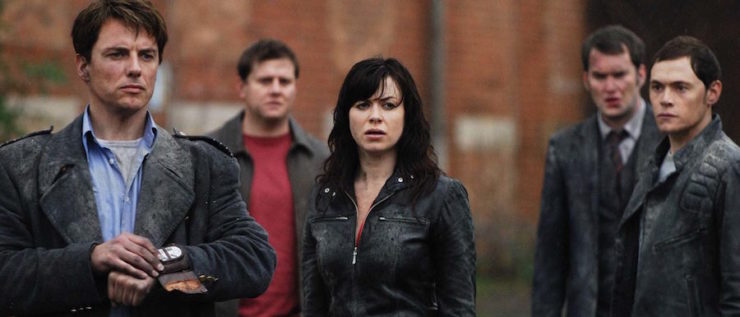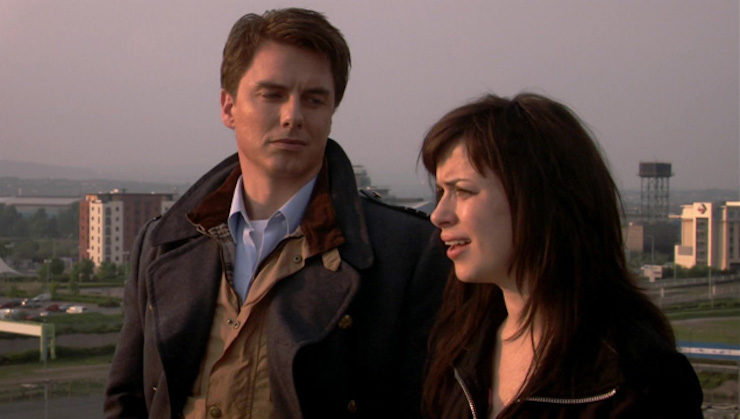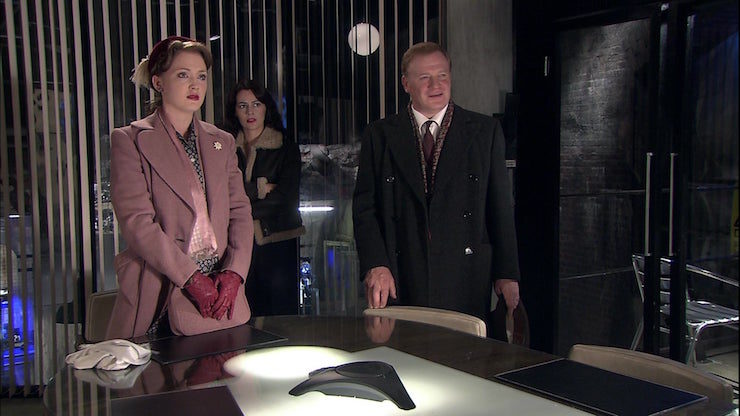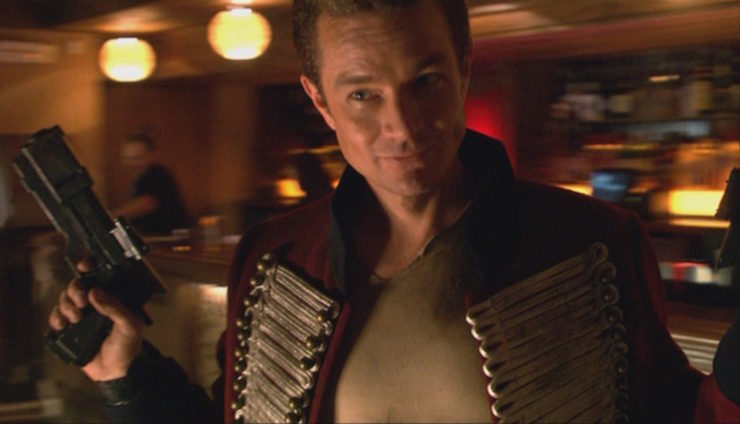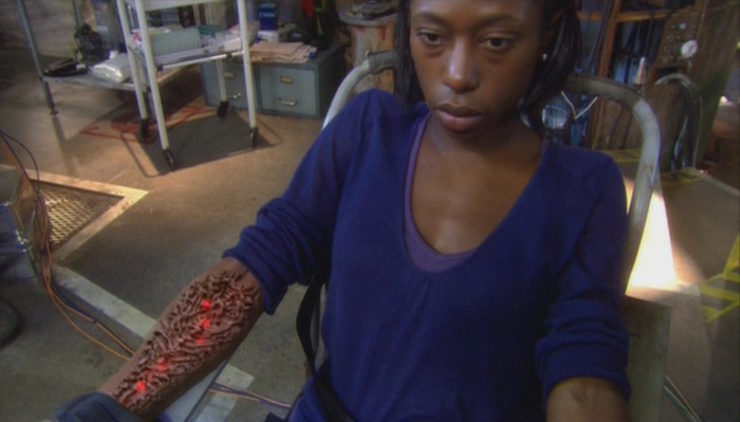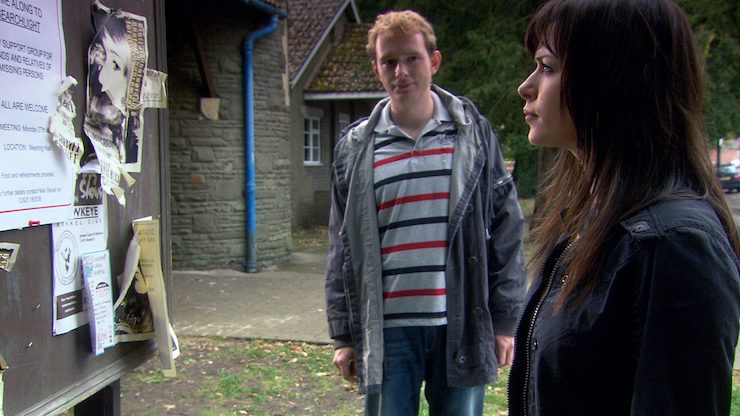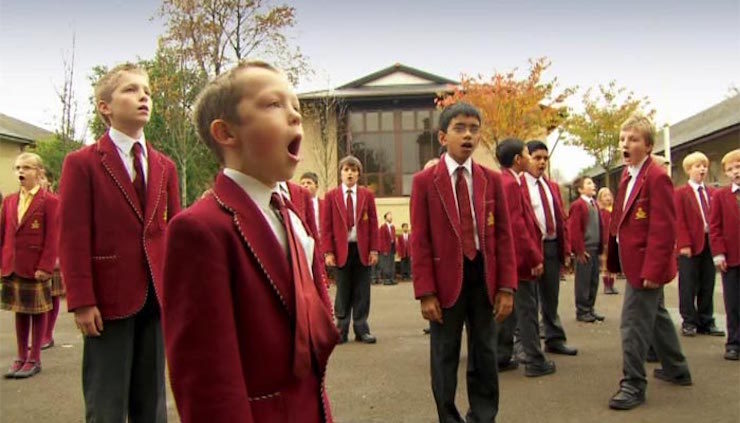The great thing about Doctor Who is how much of it there is to watch. The bad thing about Doctor Who is just how MUCH of it there is to watch, especially when you factor in the various spin-offs. Far and away the oddest of those is Torchwood. Set in the Cardiff headquarters of the organisation introduced in “Army of Ghosts” during the Tenth Doctor’s run, the series followed a team led by Captain Jack Harkness including newly recruited police officer Gwen Cooper (Eve Myles), intuitively brilliant scientist Toshiko Sato (Naomi Mori), softly spoken butler and badass Ianto Jones, laddish doctor Owen Harper (Burn Gorman), with Gwen’s fiancé Rhys Williams (Kai Owen) and her former partner PC Andy Davidson (Tom Price) rounding out the main cast.
Torchwood was WEIRD. Pretty much in every way. The unlikely collision between the cheerfully grumpy pragmatism of Cardiff and alien life was brilliant, the cast was always impressive and, on occasion, the scripts were incredible. On others, well…not so much. The show has been streaming on Twitch recently and is also available on Amazon Video and physical discs. A lot of it… isn’t great. At all. But the stuff that’s good is really worth your time. Here are the ten standouts for me.
[Some spoilers for individual episodes of Torchwood below.]
“Everything Changes,” Season 1, Ep. 1 (Written by Russell T Davies)
PC Gwen Cooper witnesses a strange group of “specialists” resurrecting a murder victim long enough to ask him what killed him. She’s drawn into their world and discovers the truth about Torchwood, the mysterious government organisation based under the city of Cardiff…
It’s not a universal truth that a great pilot means an uneven first season but…well…this is a really excellent pilot, even though a lot of what follows isn’t on the same level. The chemistry between Eve Myles’ gloriously laconic, unflappable Gwen and John Barrowman’s darkly flamboyant Jack is especially fun, and the script does a great job of walking the viewer through the organization, introducing the various characters and what they do. It lays on the “alien artifacts corrupt” thing a little thick (or, in Owen’s case, dumps it by the bucketload) but even that element of the script leads to a great payoff. Torchwood always aimed to be edgy, and the degree of edginess it reaches here, with a group of brilliant, slightly broken people surfing the edge of the ragged singularity, helps to make it one of the series’ most successful installments.
“Out of Time,” Season 1, Ep. 10 (Written by Catherine Tregenna)
Torchwood Cardiff encounter the Sky Gypsy, an aircraft that vanished in 1953 when it flew into the Cardiff Rift. They help the pilot, Diane Holmes, and her passengers, John Ellis and Emma-Louise Cowell, to adjust as best they can to the modern world, but some manage it better than others…
This is the show’s first attempt to humanise Owen Harper, who—despite Burn Gorman’s best efforts—remains the least likable character at this stage. It works well, too, and Gorman is excellent here, as Owen’s hedonistic cocoon is cracked open by Diane. Louise Delamere is excellent as the brave, open-hearted, and determined pilot and Diane ended up serving as the template for a lot of the series’ future one-off guest stars: characters with an agenda all their own and a sense that their story is a larger arc intersecting with the episode, rather than being contained within it.
The rest of the cast impresses, too. Olivia Hallinan’s Emma-Louise is a light, comedic character, but one who comes from a place of sincerity and gets one of the show’s relatively few happy endings. In contrast, Mark Lewis-Jones’ turn as John Ellis is as dark as Torchwood gets. Crushed by the guilt of discovering that his son is still alive, suffers from Alzheimer’s and has no one to care for him, John commits suicide. And Jack, unable to do anything else, dies with him, holding John’s hand so he won’t be alone. That would be powerful, brave storytelling by itself, but combined with the fact that Jack can’t die (he immediately resurrects), it becomes a complex and poignant moment for them both in an episode filled with affecting moments.
“Kiss Kiss, Bang Bang,” Season 2, Ep. 1 (Written by Chris Chibnall)
It’s the show’s other pilot episode! After a first season notable for being extremely dour and bad-tempered, “Kiss Kiss, Bang Bang” really does feel like a soft reset for the series. From the old lady muttering “BLOODY Torchwood!” as the SUV speeds by to the acknowledgement of Jack’s “holiday” over on Doctor Who Series 3, this feels like Torchwood seen through entirely different—and far more cheerful—eyes. In this light, Ianto’s crack about how maybe Jack would feel better if he stood on a rooftop and brooded a bit is especially great.
But what truly makes the episode is Captain John Hart, played with exuberant psychopathic charm by the mighty James Marsters. John is Jack with none of the corners knocked off or edges sanded down: a joyous murder teddy bear who wants to drink, sleep with, and/or kill everyone and everything. Probably all at the same time.
In fact, definitely at the same time. Starting with that poodle.
Marsters and Barrowman are a just flat-out joy to watch, playing Jack and John as men who don’t know whether to kill or kiss each other first, so are just going to do it all at once. It’s a brilliant move, showing us exactly how far Jack has come since the start of the show and how much his past still defines him. Better still, it underscores how far the team have progressed and as the episode comes to a close, Torchwood has finally stepped out of Doctor Who’s shadow and found its own voice. It’s a sweary, proudly Welsh, and often very funny voice, too.
“Sleeper,” Season 2, Ep. 2 (written by James Moran)
Torchwood are asked to consult on a case, investigating the fatal injuries sustained by a pair of burglars. They were killed in the flat of Beth Halloran (played by the always excellent Nikki-Amuka Bird) and her husband, and it looks like Beth was responsible. But how? And why can’t she remember what happened?
This is one of the episodes, like “Adrift,” that takes the somewhat nebulous aspect of Torchwood’s premise and turns it a feature, not a bug. What works best in this episode is the way a personal narrative—the tragedy of Beth and her husband—is nested inside a larger, darker story. Bird (known for her work with the Royal Shakespeare Company as well as TV and film roles) is one of the strongest actresses of her generation, and she does excellent work here as a woman who slowly realises that everything she knows is a lie. It all culminates in one of the best examples of the complex, untidy endings the show would become very fond of over the course of its run. The Doctor usually gets to save the day; Torchwood, a lot of the time, do not.
“Adrift,” Season 2, Ep. 11 (written by Chris Chibnall)
…which brings us to this episode. Gwen is asked by Andy to look into a missing persons case. In doing so, she discovers a score of people who’ve disappeared in the same way. And Jack, for some reason, doesn’t want the case looked at too closely…
I know I’m only focusing on ten episodes here but there’s a strong case to be made for just sitting down and watching (or rewatching) all of Season 2. The season as a whole doesn’t always work, but it tries a whole bunch of new things—including the tragic three-episode arc centering on a series of traumatic events inflicted on Owen and this episode, which feels like the embodiment of the show’s opening line: “The 21st century is when it all happens. And you’ve got to be ready.”
Cardiff isn’t ready. Gwen isn’t. Jack is. And this episode’s lack of a tidy resolution is arguably one of the bravest things the show does. It also cleverly uses the fact Gwen’s a police officer while exploring how that benefits her as well as what it costs her. She understands problems and is trained to deal with them; she’s conditioned to believe you can talk someone down, or slap the cuffs on someone. To believe that she can win, or at least balance the scales. This episode forces her to realize, irrevocably, that Torchwood isn’t the police and that kind of certainty, that worldview, is something she can no longer expect or rely on. The best that she can do is to simply do the work that may lead her successors to firmer ground and greater certainty. “Adrift” is a brave episode that swings for the fences, hinging on stellar turns from Barrowman, Gareth-David Lloyd, and Eve Myles, and it remains one of the show’s quieter, more successful hours.
Torchwood: Children of Earth, Season 3, 5 Episodes (written by Russell T. Davis, John Fay & James Moran)
Torchwood Season 3 is one of the best pieces of TV drama produced in the last 50 years. Opening with an alien race called the 456 suddenly speaking through every child on earth and never once slowing down from the opening scene on, the series combines kitchen sink British drama and existential cosmic horror with the narrative consequences of everything the show has been building to over the previous two seasons. The 456 have been to Earth before, and the British Government made a terrible bargain at that time, exchanging innocent lives in order to save the world from a deadly virus. Jack is one of the few people who knows what happened, and as a result, he and his entire team are targets. To make matters worse, Jack’s family are directly in the firing line, and this time, the 456 are demanding much, much more.
There’s a tangible anger to Children of Earth that puts it next to other genre greats like the final season of Quatermass and Edge of Darkness. All three have a bitterly realistic, cynical view of government and how it deals with crises, and all three shows assume the worst of people as a group and the best of people as individuals. That’s especially true here, both with Jack and John Frobisher. A Home Office Permanent Secretary, Frobisher is the dark mirror to Torchwood. He knows what’s happening, knows what he’s been told is the right thing to do, and continually struggles with both the crushing horror of the choices that must be made and what it will cost him. Peter Capaldi is typically great as Frobisher, banally evil and deeply relatable, and the series’ best moments tend to be his.
But not all of them: The consequences of Jack’s immortality, and his centuries playing the Great Game with cosmic powers, finally come home to roost, here. This is the solution to the equation posed by the last two seasons, balancing Jack as master manipulator against Jack as hero, and the result is something darker than any other plot twist the modern show has ever produced. It’s also Barrowman’s best work in the role by a considerable margin; likewise Eve Myles and Gareth-David Lloyd (whose work in this season is matched only by his extraordinarily strong performances in the Torchwood audio dramas).
Children of Earth is a hard watch but an essential one. It’s Torchwood’s finest hour, a brilliant summation of the central themes of the show and a genuinely great piece of modern science fiction.
Taken as a whole, Torchwood is uneven, unpredictable, and occasionally brilliant. These ten episodes represent, for me, the very best of the show, and provide the foundation on which Big Finish’s excellent audio dramas continue to build. It’s remains far and away the most uneven of the various Who spinoffs—but also, if you catch the right episodes, one of the all-time best.
Alasdair Stuart is a freelancer writer, RPG writer and podcaster. He owns Escape Artists, who publish the short fiction podcasts Escape Pod, Pseudopod, Podcastle, Cast of Wonders, and the magazine Mothership Zeta. He blogs enthusiastically about pop culture, cooking and exercise at Alasdairstuart.com, and tweets @AlasdairStuart.










